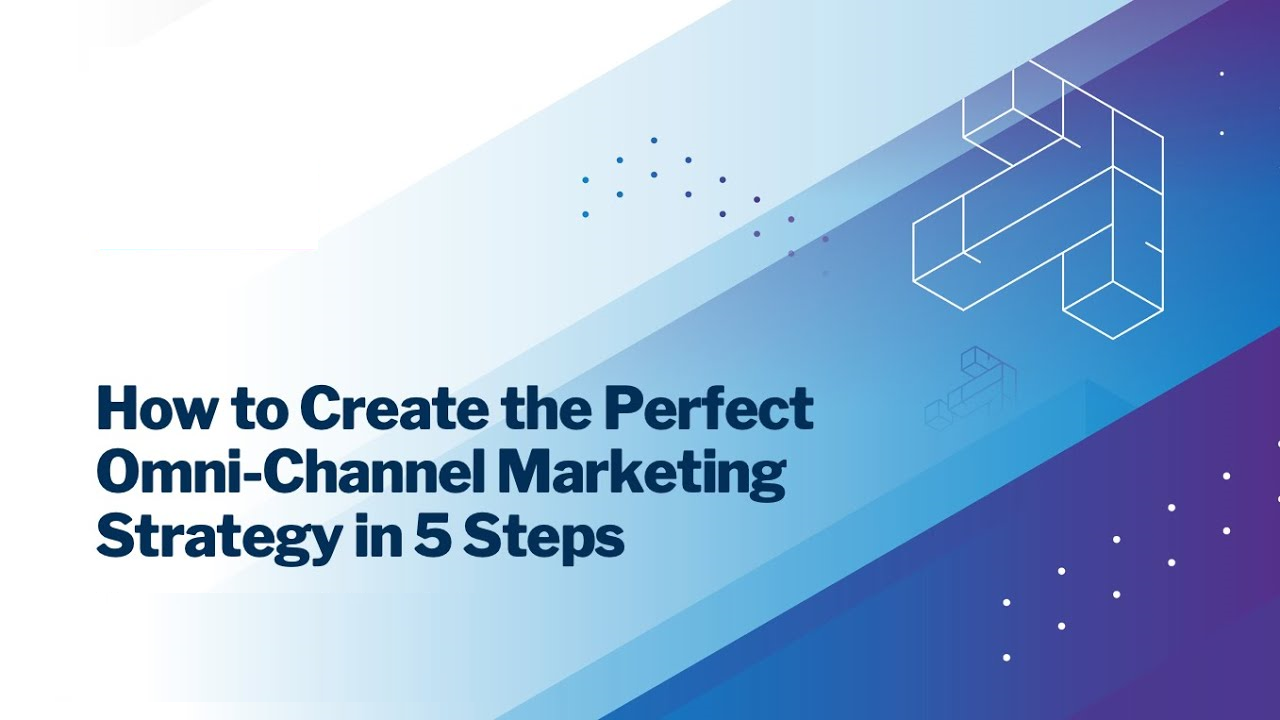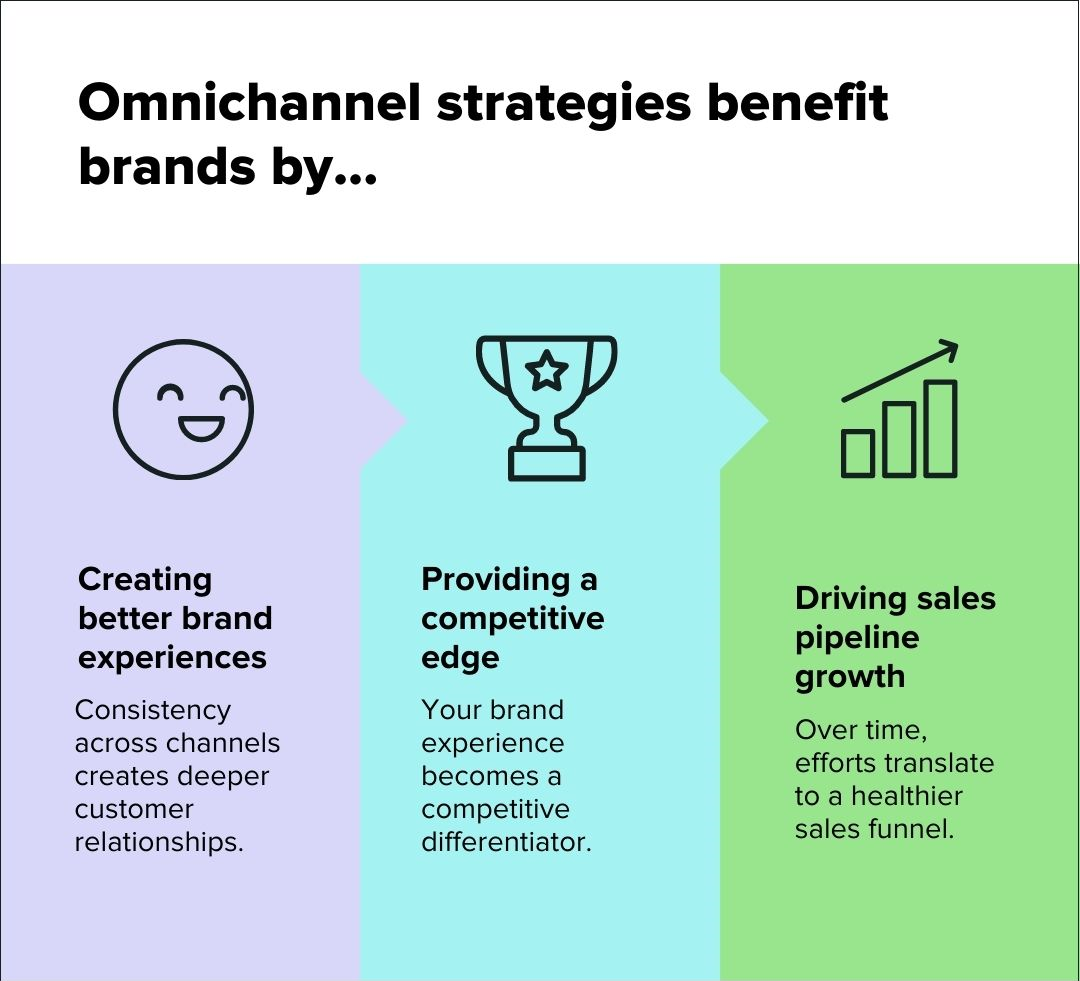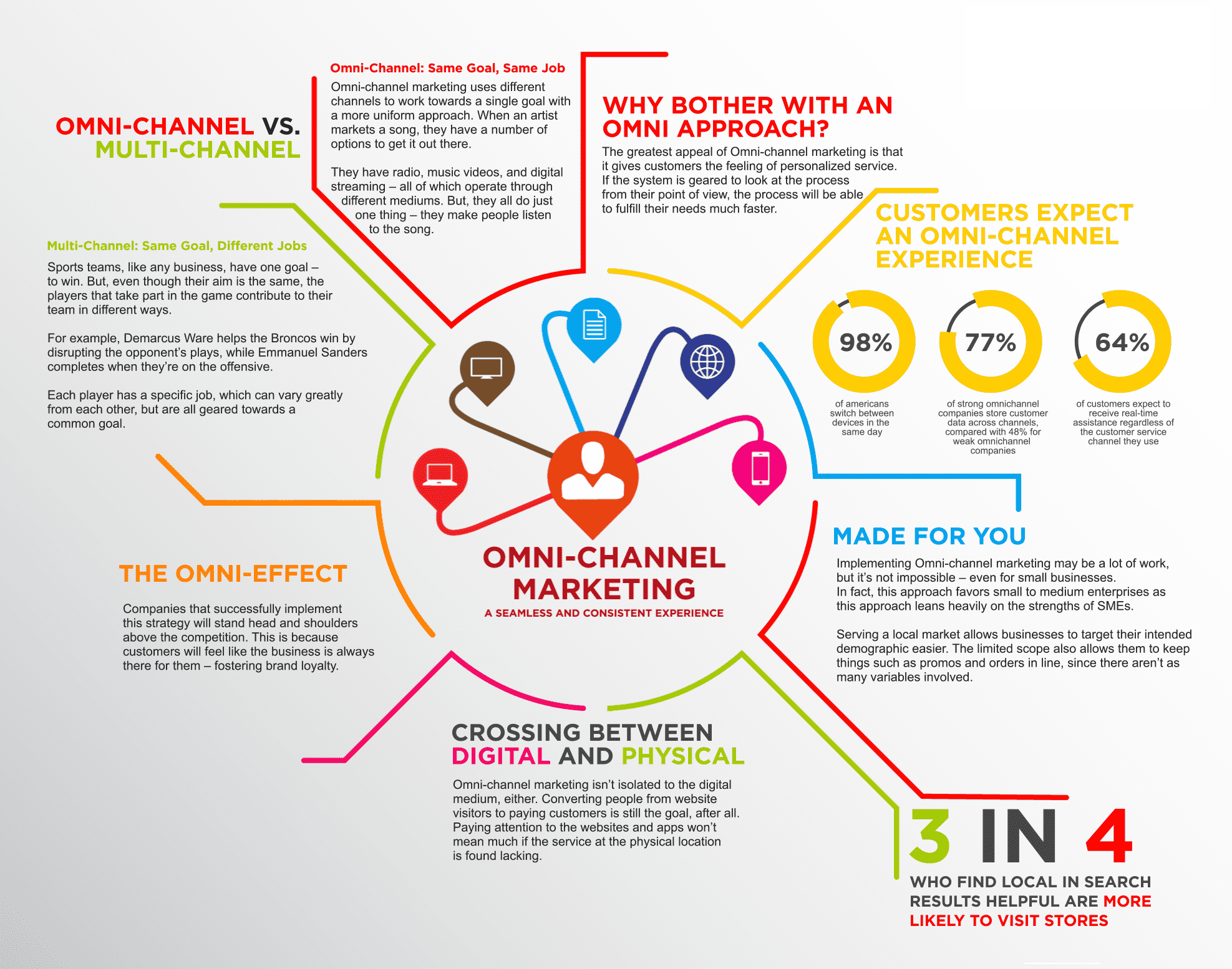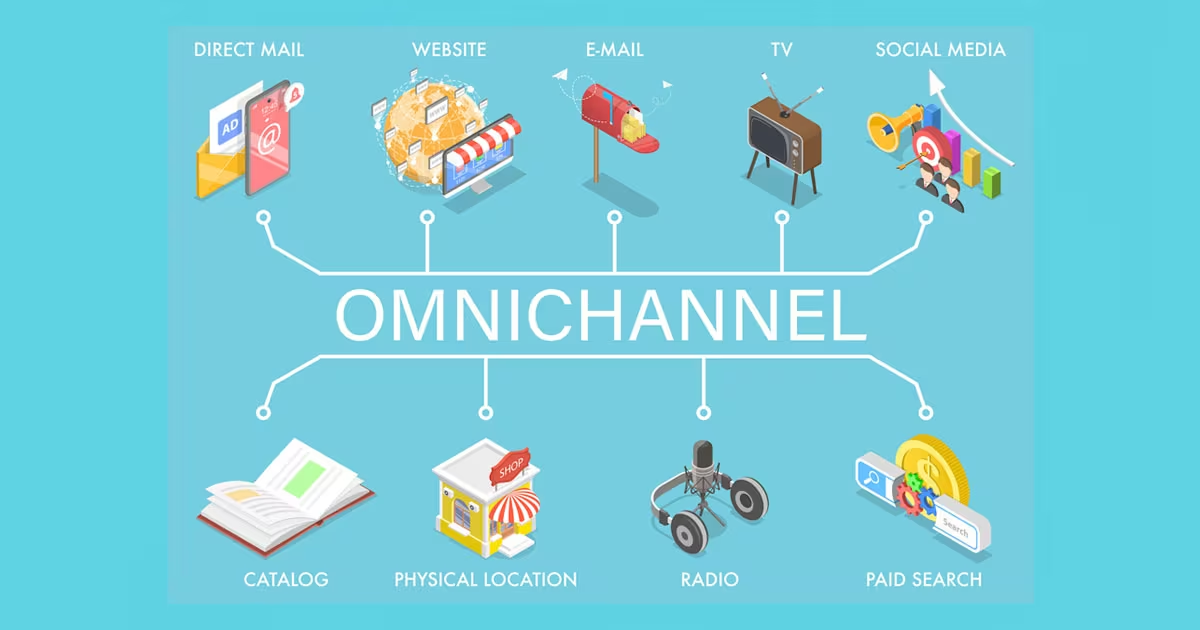
In today's competitive businesslandscape, a siloed approach to marketing is no longer enough. How To Create The Perfect Omnichannel Marketing Strategy?To truly capture the attention and loyalty of your customers, you need to embrace the power of omnichannel marketing. This innovative strategy seamlessly integrates all your marketing channels, creating a unified customer experience that spans across every touchpoint.
With omnichannel marketing, you can engage your customers in a more personalized and meaningful way, fostering stronger relationships and driving businessgrowth. By understanding your customers' preferences and behaviors across all channels, you can deliver targeted messaging and offers that resonate deeply with them.
What Is Omnichannel Marketing?
Omnichannel marketing is a marketing strategy that seeks to provide a seamless customer experience across all channels. This means that customers should be able to interact with a brand in the same way, regardless of whether they are using a website, mobile app, social media, or in-store.
Omnichannel marketing is a customer-centric approach that integrates all marketing channels to deliver a unified and consistent brand experience across all touchpoints. It ensures customers can seamlessly interact with the brand across different platforms, enhancing their overall brand experience.
The term "omnichannel" refers to the idea of providing customers with a seamless experience across all channels, whether they are interacting with the brand online, offline, or through mobile devices. This is in contrast to multichannel marketing, which simply involves using multiple channels to reach customers.
Why Should You Create An Omnichannel Strategy?
In today's competitive business landscape, it is more important than ever to create a cohesive and consistent customer experience across all channels. This is where omnichannel marketing comes in. Omnichannel marketing is a strategy that seeks to provide a seamless customer experience across all channels, whether it be online, in-store, or mobile.
Here are some of the benefits of creating an omnichannel marketing strategy:
- Increased customer engagement -Omnichannel marketing can help you to increase customer engagement by providing a more personalized and relevant experience across all channels. For example, you can use customer data to target your customers with specific offers and promotions, or you can use social media to interact with your customers in real time.
- Improved brand perception -Omnichannel marketing can also help you to improve brand perception by creating a consistent and cohesive brand experience across all channels. This can help to build trust with your customers and make them more likely to do business with you.
- Increased sales -Omnichannel marketing can also lead to increased sales by providing a more seamless and convenient shopping experience for your customers. For example, you can let your customers start their shopping online and finish it in-store, or you can allow them to return items purchased online to any of your store locations.
- Stronger competitive advantage -Omnichannel marketing can also give you a stronger competitive advantage by helping you to differentiate your brand from your competitors. In today's digital landscape, it is no longer enough to simply be present online. You need to create a unique and engaging experience that will make your customers want to do business with you.
5 Easy Steps To Create The Perfect Omnichannel Marketing Strategy?
Here are five easy steps to create the perfect omnichannel marketing strategy:
1. Define Your Goals And Objectives
What do you want to achieve with your omnichannel marketing strategy? Are you looking to boost sales, increase customer engagement, or improve brand awareness? Once you know your goals, you can start to develop a plan to achieve them.
2. Understand Your Customers
Who are your target customers? What are their needs and preferences? How do they interact with your brand? Knowing your customers will help you create contentand offers that are relevant to them.
3. Choose The Right Channels
Not all channels are created equal. Some channels may be more effective for reaching your target audience than others. Consider your budget, resources, and target audience when choosing the channels that you will use. Some of the most popular omnichannel marketing channels include:
- Website -Your website is your online storefront. It should be designed to be user-friendly and informative. You should also use your website to collect customer data and track their behavior.
- Social media - Social media is a great way to connect with your customers and build relationships. You can use social media to share content, run contests, and promote your products and services.
- Email -Email is still one of the most effective ways to reach customers. You can use email to send targeted messages, promote special offers, and build relationships.
- Mobile app -A mobile app can provide your customers with a convenient and personalized way to interact with your brand. You can use your mobile app to send push notifications, provide customer support, and offer exclusive deals.
- In-store - Your physical store is another important channel for omnichannel marketing. You can use your store to provide a personalized shopping experience, offer in-store events, and collect customer data.
4. Integrate Your Channels
Your omnichannel marketing strategy should be cohesive across all channels. This means that your messaging, offers, and customer data should be consistent across all channels. You can use technology to help you integrate your channels. For example, you can use a customer relationship management (CRM) system to track customer data across all channels.
5. Measure Your Results
It is important to track your progress and measure the results of your omnichannel marketing campaigns. This will help you to identify what is working and what is not, so that you can make adjustments as needed. Some of the key metrics to track include:
- Website traffic
- Social media engagement
- Email open rates and click-through rates
- Mobile app downloads and usage
- Sales
- Customer satisfaction
Once you have a good understanding of your customer journey, you can start to develop a content strategythat is tailored to each stage. For example, you might create informative blog posts for the awareness stage, white papers for the consideration stage, and case studiesfor the decision stage.
Omnichannel Vs Multichannel Marketing
Here is a summary of the key differences between omnichannel and multichannel marketing:
1. Multichannel marketinginvolves using multiple channels to reach customers, such as online, offline, and mobile. However, these channels are not necessarily integrated, and the customer experience may not be consistent across all channels.
2. Omnichannel marketingis a customer-centric approach that integrates all marketing channels to deliver a unified and consistent brand experience across all touchpoints. This means that the customer experience is seamless and consistent, regardless of the channel they are using.
Here is a table that summarizes the key differences between omnichannel and multichannel marketing:
| Feature - Omnichannel Marketing | Feature - Multichannel Marketing |
| Focus - Customer-centric | Focus - Channel-centric |
| Goals - Unified, consistent customer experience | Goals - Reach customers across multiple channels |
| Approach - Integrated | Approach - Non-integrated |
| Results - Seamless, consistent customer experience | Result - Disconnected customer experience |
Here are some examples of how businesses can implement omnichannel marketing:
- A customer starts shopping online and adds items to their cart. They then leave their computer and complete their purchase on their mobile phone.
- A customer receives a personalized emailfrom a retailer with a discount code for their birthday. They then use the code to purchase an item in-store.
- A customer sees a social media ad for a product they are interested in. They then click on the ad and are taken to the retailer's website to purchase the product.
Omnichannel Platforms To Consider When Making Your Strategy
Omnichannel platforms are software solutions that help businesses manage their marketing and sales efforts across multiple channels. They can be used to track customer data, automate tasks, and create targeted campaigns.
Here are some of the top omnichannel platforms to consider when making your strategy:
- Adobe Experience Cloud - Adobe Experience Cloud is a suite of marketing and customer experience management (CXM) tools that can be used to create, deliver, and manage omnichannel experiences. business.adobe.com
- Salesforce Marketing Cloud - Salesforce Marketing Cloud is a cloud-based marketing automation platform that can be used to create and manage targeted campaigns, track customer data, and measure results. www.signitysolutions.com Salesforce Marketing Cloud Omnichannel Platform
- Marketo Engage - Marketo Engage is a marketing automation platform that can be used to automate marketing tasks, track customer data, and nurture leads.
- Oracle Eloqua - Oracle Eloqua is a cloud-based marketing automation platform that can be used to automate marketing tasks, track customer data, and nurture leads. www.oracle.comOracle Eloqua Omnichannel Platform
- HubSpot Marketing Hub - HubSpot Marketing Hub is a marketing automation platform that can be used to create and manage targeted campaigns, track customer data, and measure results.www.hubspot.comHubSpot Marketing Hub Omnichannel Platform
When choosing an omnichannel platform, it is important to consider your business needs and budget. You should also make sure that the platform you choose is integrated with your other marketing and sales tools.
Once you have chosen an omnichannel platform, you can start to develop your omnichannel marketing strategy. This strategy should define your goals and objectives, identify your target audience, and choose the channels that you will use to reach them.
Here are some tips for developing an effective omnichannel marketing strategy:
- Start small - Start by focusing on a few channels and then expand as you become more familiar with the platform.
- Be consistent -Make sure that your messaging and brandingare consistent across all channels.
- Use data to drive your decisions -Use customer data to create targeted campaigns and measure the results of your efforts.
- Be patient -It takes time to build a successful omnichannel marketing strategy.
What Are The Four Pillars Of Omnichannel Strategy?
The four pillars of omnichannel strategy are:
1. Visibility
Omnichannel marketing requires a single view of the customer. This means that businesses need to be able to collect and integrate data from all of their marketing channels. This data can then be used to create a unified customer profile that can be used to personalize marketing campaigns and measure the results of those campaigns.
2. Measurement
In order to measure the success of your omnichannel marketing strategy, you need to track the impact of each marketing touchpoint. This means tracking metrics such as website traffic, social media engagement, and email open rates. By tracking these metrics, you can identify which channels are most effective at reaching your target audience and generating revenue.
3. Personalization
Personalization is a key component of omnichannel marketing. This means that businesses need to use customer data to deliver one-to-one customer experiences in real time. For example, you can use customer data to recommend products or services, send targeted email campaigns, and create personalized website experiences.
4. Optimization
Omnichannel marketing is an ongoing process that requires constant optimization. This means that businesses need to regularly review their strategy and adjust their budget based on the results of their marketing campaigns. By optimizing your omnichannel marketing strategy, you can ensure that you are getting the most out of your marketing investment.
What Are The Three Core Omnichannel Strategies?
There are three core omnichannel strategies that businesses can use to create a seamless and consistent customer experience across all channels:
1. Commerce Omnichannel Strategy
This strategy focuses on providing a unified shopping experience across all channels, whether online, in-store, or mobile. This includes things like:
- Enabling customers to start their shopping online and finish it in-store.
- Offering a seamless checkout experience across all channels.
- Providing real-time inventory visibility across all channels.
2. Personalization Omnichannel Strategy
This strategy focuses on using customer data to deliver personalized experiences across all channels. This includes things like:
- Recommending products or services based on past purchases and browsing behavior.
- Sending targeted email campaigns based on customer interests.
- Creating personalized website experiences based on customer location and demographics.
3. Ecosystem Omnichannel Strategy
This strategy focuses on integrating all of the different systems and tools that businesses use to interact with customers. This includes things like:
- Integrating the CRM system with the e-commerce platform.
- Connecting the social media managementtool with the marketing automation platform.
- Unifying customer data across all systems.
The best omnichannel strategy for a business will depend on its specific goals and objectives. However, all three of these strategies can help businesses to create a more seamless and consistent customer experience that will drive sales and loyalty.
How To Create The Perfect Omnichannel Marketing Strategy? - FAQ's
What Is A Good Omnichannel Strategy?
An omnichannel strategy is a sales and marketing method designed to deliver a seamless and consistent customer experience across all touchpoints. That might include brick-and-mortar shops, websites, email, social and mobile, anywhere a brand is present.
How Do You Create A Successful Omnichannel Experience?
Design your omnichannel experience. You need to create a seamless and consistent brand identity, voice, and message across all channels and touchpoints, and ensure that your content, offers, and interactions are relevant, personalized, and engaging for each customer segment and stage of the journey.
What Are The Keys To Succeeding With An Omnichannel Strategy?
Knowing your customer's journey map is essential for a successful omnichannel strategy, since you will know where your customer prefers to buy, how they prefer to do it, and which channels you should take into account to deploy marketing strategies and increase sales.
Conclusion
In conclusion, it is evident that omnichannel marketing is essential for businesses that want to thrive in today's digital landscape. By integrating all marketing channels and creating a unified customer experience, businesses can reap a multitude of benefits, including increased customer engagement, loyalty, and satisfaction. Additionally, omnichannel marketing can lead to improved brand perception, increased sales, and a stronger competitive advantage.
To successfully implement omnichannel marketing, businesses must first break down silos and ensure that all departments are working together towards a common goal. Additionally, businesses need to invest in the right technology and tools to support their omnichannel strategy. Finally, businesses must be willing to adapt and evolve their approach as customer expectations and behaviors change.


